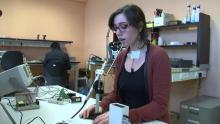The programme is organized as follows:
In Year 1 you will learn the fundamentals of Electronics, Electromagnetism and Measurements through courses organized in four pairs:
- DIGITAL ELECTRONICS/ INTEGRATED DIGITAL SYSTEMS: techniques to design complex digital architectures both at the level of boards and systems and at the level of integrated microsystems;
- MEASUREMENT SYSTEMS AND SENSORS/TESTING AND CERTIFICATION: advanced techniques and measurement systems in both analog and digital domains;
- HIGH SPEED ELECTRON DEVICES/ OPTOELECTRONICS: techniques for analysis and design of high frequency and optoelectronic devices;
- ANALOGUE AND POWER ELECTRONICS/ ANALOG AND TELECOMMUNICATION ELECTRONICS: design techniques of complex analog circuits with discrete and integrated components as well as digital integrated circuits.
On top of these courses, you will choose an optional course in the field of mathematics, signal processing or hardware/software integration.
These core subjects will help you choose a specialist track for further study.
At the end of the programme you will work on a thesis project.
The Master’s degree programme is taught both in Italian and English.
You will take part in face-to-face lectures, classroom practicals, computer and/or hardware laboratories, experimental work. You will develop small projects and apply theoretical concepts to real cases. You will also participate in three interdisciplinary workshops that will boost the soft skills that are most sought after by employers.
You will able to decide if you wish to work on your thesis project at a foreign university or company.
As an Electronic Engineer you will be able choose from a variety of career fields:
DATA ANALYST: you will analyse market requirements and objectives set by customers or firms (not necessarily electronic companies); you will identify new applications for electronic systems and devices and analyse components or systems, including highly complex ones, defining their specifications to achieve the objectives specified by the customer;
SYSTEMS DESIGNER: you will design components or analog/digital electronic systems, and, if necessary, you will develop new components with features not found on the market (new devices and integrated circuits), and complete integrated systems (System-On-Chip). This includes even very complex systems with innovative features and performance that require the integration of various specialized aspects of ICTs;
DIRECTOR OF LABORATORIES AND HIGH-TECH ELECTRONIC FACILITIES: you will set up and manage industrial research and development projects.
RESEARCHER: you will work in companies and research institutions to develop new electronic devices and applications as well as advanced system applications of all types which use electronic devices;
FREE-LANCE PROFESSIONAL: you will work as an electronic engineering consultant in businesses, government agencies, as well as in organisations of other sectors.
